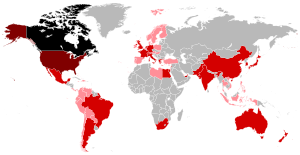
Canadians
Citizens and nationals of Canada / From Wikipedia, the free encyclopedia
Dear Wikiwand AI, let's keep it short by simply answering these key questions:
Can you list the top facts and stats about Canadians?
Summarize this article for a 10 year old
Canadians (French: Canadiens) are people identified with the country of Canada. This connection may be residential, legal, historical or cultural. For most Canadians, many (or all) of these connections exist and are collectively the source of their being Canadian.
 | |
| Total population | |
|---|---|
| Canada: 39,858,480 (Q2 2023)[1] Ethnic origins:[2][3]
| |
| Regions with significant populations | |
 | |
| United States | 1,062,640[5] |
| Hong Kong | 300,000[5] |
| United Kingdom | 73,000[5] |
| France | 60,000[6] |
| Lebanon | 45,000[5] |
| United Arab Emirates | 40,000[7] |
| Italy | 30,000[8] |
| Pakistan | 30,000[9] |
| Australia | 27,289[5] |
| China | 19,990[5] |
| Germany | 15,750[10] |
| South Korea | 14,210[5] |
| Japan | 11,016[5] |
| Languages | |
| Religion | |
Religions of Canada[11]
| |
Canada is a multilingual and multicultural society home to people of groups of many different ethnic, religious, and national origins, with the majority of the population made up of Old World immigrants and their descendants. Following the initial period of French and then the much larger British colonization, different waves (or peaks) of immigration and settlement of non-indigenous peoples took place over the course of nearly two centuries and continue today. Elements of Indigenous, French, British, and more recent immigrant customs, languages, and religions have combined to form the culture of Canada, and thus a Canadian identity. Canada has also been strongly influenced by its linguistic, geographic, and economic neighbour—the United States.
Canadian independence from the United Kingdom grew gradually over the course of many years following the formation of the Canadian Confederation in 1867. The First and Second World Wars, in particular, gave rise to a desire among Canadians to have their country recognized as a fully-fledged, sovereign state, with a distinct citizenship. Legislative independence was established with the passage of the Statute of Westminster, 1931, the Canadian Citizenship Act, 1946, took effect on January 1, 1947, and full sovereignty was achieved with the patriation of the constitution in 1982. Canada's nationality law closely mirrored that of the United Kingdom. Legislation since the mid-20th century represents Canadians' commitment to multilateralism and socioeconomic development.